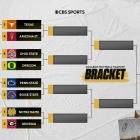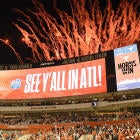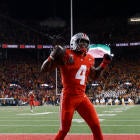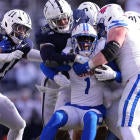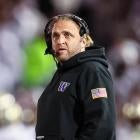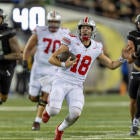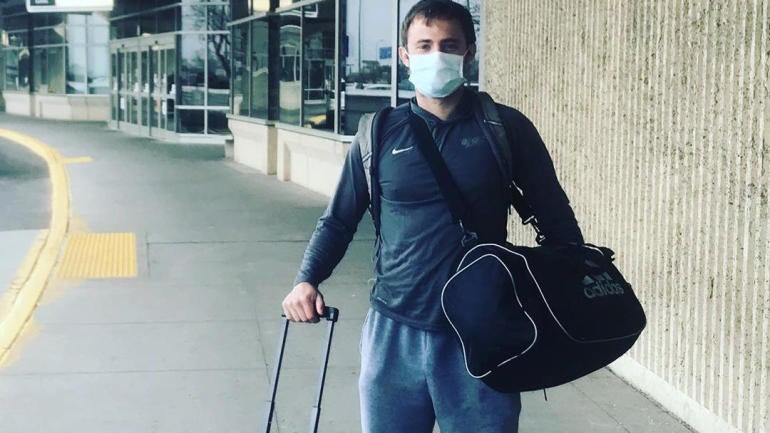
Alex Charlton has become an extreme rarity. From halfway across the country, he intentionally got on a plane to New York last Friday, wading emotionally and physically into the coronavirus pandemic.
"I'll be honest with you," the 29-year-old Midwestern State graduate assistant said. "One way or another, I'm probably going to get it."
That was the first mental hurdle to clear when Charlton decided to put his coaching career on hold and offer his skills as a nurse.
At some sort of a life/football crossroads, this is -- at least temporarily -- his path. It puts him in the crosshairs of a global killer. It also fills his heart.
"I couldn't look back and think, 'Hey, I could have helped but I didn't,'" Charlton explained.
Soon after that declaration, he put on his face mask, entered Kansas City International's B Terminal and flew 1,800 miles to answer New York hospitals' desperate call for qualified nurses.
The road ahead is neither popular for most 29-year-olds nor necessarily safe. There were 29 people on Charlton's flight. Everyone had their own row.
His football story is one of every graduate assistant in the country. Low pay. Long hours. Long years. Charlton has chased a full-time spot on a college football staff for more than a decade.
His present story is the pursuit of an alternate profession as a caregiver. For now, the Kansas City native has chosen to drop everything football and start Monday at Mount Sinai Hospital in New York.
If you've followed the news, the 168-year-old institution happens to be a COVID-19 hotspot within a hotspot.
"The nursing supervisor said, 'You know why we're hiring you right? COVID-19,'" Charlton recalled. "'I just want you to know this is the front line of the front line. I just want to make sure you can come out here and handle this.'"
Charlton is about to find out. Life now comes at him in bursts of revelation. Upon arriving in New York, Charlton texted that it was a "ghost town" until he happened upon a Trader Joe's. There were 140 people in line.
During a run, he saw a hospital tent set up in Central Park.
"Streets are empty," Charlton texted on Saturday. "No traffic. Subways empty. Just a met a nice guy named Chris who bought me a cup of coffee. He figured I wasn't from around here."
Who knows where this adventure will lead? The contract is for two months. A nurse staffing agency is paying him a healthy stipend. Charlton has found a nice Airbnb off Central Park West. The previous tenants have headed back to France and California.
The original idea was to be back on campus around June 1. Midwestern State is a Division II program in Wichita Falls, Texas.
"Quite honestly," Charlton said, "[the stay] may be for more than two months."
The virus shows no signs of abating.
"Trust me, I want to be coaching football," Charlton added. "This also reminds you that football is football and lives are lives."
His longing to be a college coach has been there since at least 2009 when former Kansas coach Mark Mangino brought Charlton onboard as a student manager.
"Freshman year, he's 18 years old, on the headset charting plays for [then Kansas defensive coordinator Clint] Bowen," Alex's dad, Chris Charlton, said proudly.
Alex then went on to work for Kansas coaches Turner Gill and Charlie Weis. At one point, Charlton was making a decent living as a player personnel assistant under Weis.
"Instead of going out partying and all that stuff, I would basically wake up on Saturday morning at 6 a.m. and ask the coaches what I could do to help," Charlton said.
He and Weis' son bonded at Kansas, working together from 2012-14 and rooming together for a year. Charlie Weis Jr., now South Florida's offensive coordinator, has been working ever since to get his friend a full-time job.
"He's risking his life to do it, making a huge decision. There's a good chance even if he got [the coronavirus], he could make it through. Still, to put yourself at risk, that's a real hero," Weis Jr. said. "It's braver than anything I've done."
Chris Charlton said his son's goal in life is to be the head coach at Kansas. But when David Beaty took over in 2015, a chance to join the new KU staff fell through.
"I've tried to help him many times, but a lot of times it didn't work," said Scott Vestal, Rice linebackers coach. "In my opinion, not because he couldn't get the job. It wasn't necessarily the right fit. … The market is completely saturated."
Vestal and Charlton also worked together at Kansas.
Alex's longing to serve others was born out of a gap in that coaching chase. While between gigs, Charlton got his nursing degree at Missouri-Kansas City in May 2018.
"The common theme from probably 20 different friends, aunts, uncles, parents, brothers was, 'Hey, you ought to think about being a nurse,'" Alex Charlton said. "The moment that was said, it intrigued me. Maybe it was my true calling from the beginning."
Yeah, but football won't let go. His 2013 undergraduate degree from KU is in general studies. Charlton called it the fastest degree track to get him to coaching as soon as possible. After nursing school, the coaching bug bit again. Charlton coached at a local high school in the fall of 2018.
He joined Midwestern State last month, working only a few weeks before Mount Sinai called. In that short period, Charlton made quite an impact helping with the Mustangs wide receivers.
Midwestern State coach Bill Maskill chose Charlton to speak to the team about the coronavirus before the players left for home.
"I wanted him to talk from a nurse's perspective," said Maskill, entering his 19th season. "In the next week, it just got worse and worse and worse."
The job market is saturated. The professional path for GAs can be uncertain. Grunt work is common. Charlton has outstanding student loans at both KU and UMKC. That doesn't help when GAs sometimes have to pay for graduate school while paying their dues.
Maskill said he made $1,000 a month as an Iowa GA in the 1970s. About $150 of that went to pay for parking on campus. Then there were taxes.
"I didn't know what the hell I was getting into," Maskill said. "I went to work at 7 a.m. and went to bed at 2 a.m. … Needless to say, I learned how to be a grinder at age 21, 22."
In the offseason, Maskill worked as a bartender and in a clothing store to make ends meet.
"That's one of the things that interested us in him," Maskill said of Charlton. "He had a career. He had been a student manager. He had been a GA."
Not surprising, then, that Charlton flipped open his computer as soon as he arrived in New York. He is going through recruiting film and sending out emails.
"We're recruiting," Charlton said. "I'll always be a nurse. I'll always be a coach. That will never change. It's a matter of what exactly am I doing at the time? The future absolutely is being a coach."
Charlton's girlfriend, Carli, gave her blessing with the usual plea: Be safe. The two visited the 9/11 Museum in New York this January.
"You couldn't walk five feet without a tear coming to your eye," he said.
As for this tragedy, Charlton remains clear-headed about walking into it. "I'm a healthy individual," he added. "I would just like to think, if I get it, I would handle it well."
It was suggested to Charlton this noble adventure might do more for his resume than any coaching experience. How many coaches do you know at this moment who will be saving lives by day and recruiting by night?
More to the point, how many coaches have triaged patients afflicted with a deadly virus. How many stared down that virus with little regard for their own health?
Someone in football, please hire this guy.
"It does make your heart stop and stomach sink for a split second when someone says, 'Risk your life,'" Charlton said. "But then you are quickly reminded of why you are here and you don't think about it again.
"It's simply to help others and there is no greater feeling than that."








